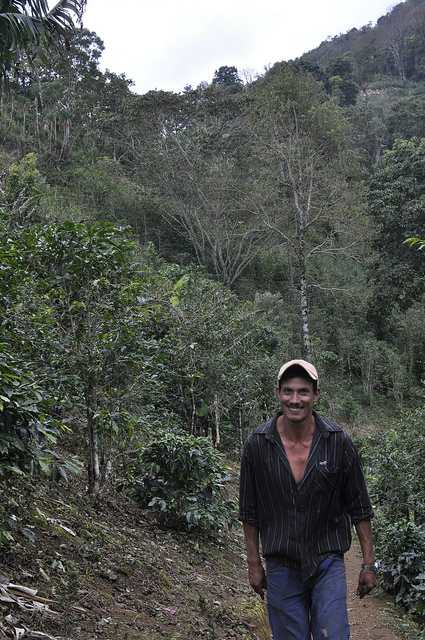 Edy Neptaly Bautista
Farm Name: Jazmin
Micro Region: El Cedral
Region: Santa Barbara
Farm Size: 2.10 hectares
Variety: Pacas
Altitude: 1500 m.a.s.l.
Processing: Washed
Edy Neptaly Bautista
Farm Name: Jazmin
Micro Region: El Cedral
Region: Santa Barbara
Farm Size: 2.10 hectares
Variety: Pacas
Altitude: 1500 m.a.s.l.
Processing: Washed
Neptaly lives on the border of El Cedral, very close to El Cielito, where he owns another small plantation, planted with Pacas bushes. We first met Neptaly at San Vincente in 2009 and have bought from him since. Throughout our partnership, we have had several discussions about how the potential of producing even better quality coffee through investments in his own facilities, especially drying beds. We have seen improvements each year in the quality of the green coffee coming from Jazmin and this year is no exception - the quality of his coffee has improved substantially this year. We have known each other for several years now, and it has become a good friendship and sustainable partnership for both of us.
Neptaly is one of the greatest representatives to exemplify the wonderful improvements in Santa Barbara in recent years.
Husbandry and processing work and improvements: - he has the resources to buy the fertilizer he needs and he applies it in timely fashion, which is very important. - he does all the pruning and field work himself. He has a small farm and he is a very proud farmer (and wants to do as much as possible himself) - he manages the picking team of 12 seasonal workers (cherry pickers) during harvest to ensure a good quality. Red picking is key and in working with Neptaly, the pickers really understand the importance of quality! - he has built his own processing facility after he decided to do it by himself, not with his brother in-law as previously. He now with full control. - he has built a new parabolic/solar bed for drying his coffee, just like the Moreno brothers, so he is more in charge of that process too. - he has bought a new little piece of land so he can plant more coffee trees. - he has built a new house in the city so his children can go to college there. - he doesn't own a car but he has just bought a motorcycle so he can get around more easily.
Neptaly has two farms (less than 1ha each). The one that has the best coffee is an hour’s walk away from his farmhouse. So during picking season, cherries are transported by mule to the processing facility.
Background to Santa Barbara
The villages Cielito, Cedral and Las Flores follow one after another along the mountain range in Santa Barbara. Grown on this hillside is mostly Pacas, a coffee species akin to Bourbon, as well as Yellow Catuaí and Pacamara. It is challenging to process coffee cherries in areas like these, which are close to the jungle and thus, to rain. The drying process, in particular, is especially demanding. But when these processes are precisely controlled, seemingly problematic factors (like drying under challenging conditions) are what make coffee from this area particularly interesting. The coffee produced here cups with flavour attributes not found anywhere else in Central America.
Since 2005, the region, Santa Barbara, and the small producers living and working there, have shared the distinction as the place and the people producing exceptional coffee within Honduras. Our work and the beginning of the on-going relationships we’ve since established here began during the 2005 Cup of Excellence. We came to realize that there are exceptional producers from this small area. And since that inaugural year, we have purchased from over twenty different Santa Barbara producers.
Located in the village of Pena Blanca is coffee exporter San Vicente – the company that coordinates the coffee we buy from Santa Barbara. Over the past several years, one particular hillside has become the largest supplier of CoE winners in Honduras. The most successful farms with the smartest and most innovative farmers are neighbours on this hillside and they help each other to refine the best of their lots.
There exists an eagerness here; a willingness, motivation and ambition to produce the best coffee in the country. But there are also large differences amongst the farmers and our purpose is to be close to this special coffee community and get to know the most ambitious of the farmers here; the ones we can develop something with. In order to build relationships – that allow both parties to have a common understanding of quality coffee – there must be frequent and long-term presence.
To produce coffee that tastes fruity is not very complicated. But to produce coffee that is clean, clear, fresh and fruity – that’s an art. One of the biggest assumptions within specialty coffee is that coffee from high-altitude areas naturally exhibits these characteristics. But high elevation can lead to potential problems, even in tropical climates. In the highest areas of Santa Barbara, up to and over 1800 meters, producers can experience “freezing”: the combination of temperatures between 4-5C and rainfall that combine to cause cherries to not ripen and leaves to die on the bush. These conditions create a cold and humid climate, which is hazardous for processing and requires steady and reliable drying conditions for coffee so quality will not deteriorate. These natural conditions, of course, cannot be evaded. But clever and prescient coffee farmers, like the ones we collaborate with, invest in drying systems that minimize the risks associated with weather.
[gigya src="http://www.flickr.com/apps/slideshow/show.swf?v=71649" width="700" flashvars="offsite=true&lang=en-us&page_show_url=/photos/100617082@N06/sets/72157640465831916/show/&page_show_back_url=/photos/100617082@N06/sets/72157640465831916/&set_id=72157640465831916&jump_to=" allowFullScreen="true" ]


